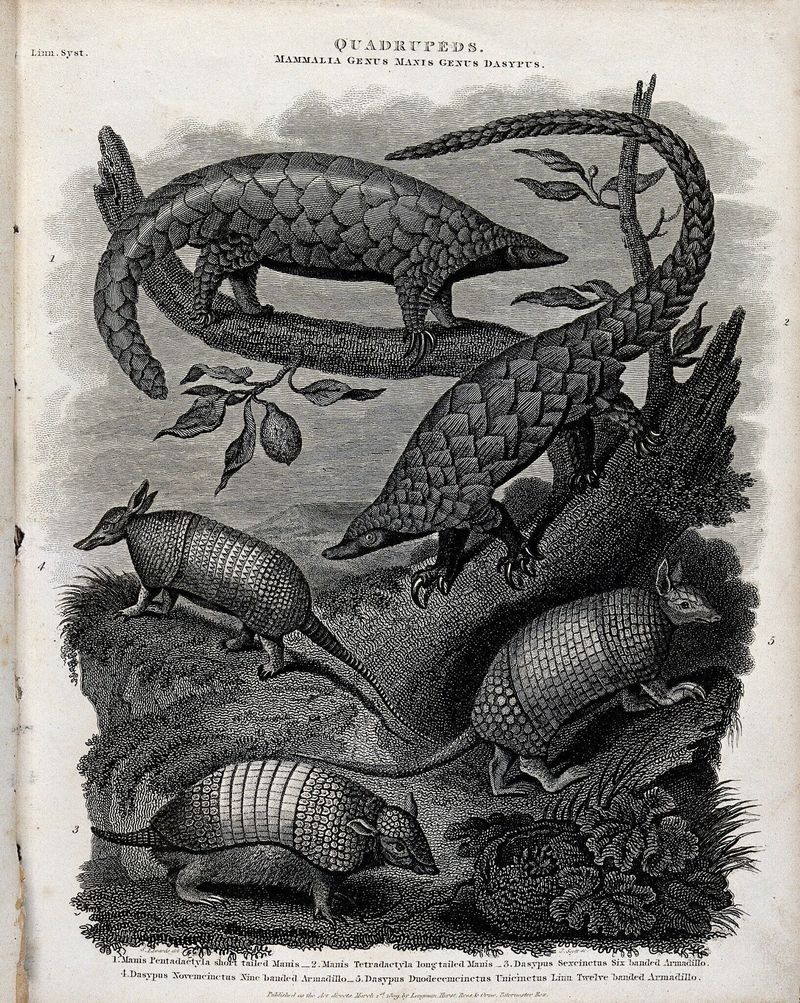|
| Query: Mammal | Result: 16th of 3464 | |
Five four-footed mammals, including manis and armadillos
| Subject: | Five four-footed mammals, including manis and armadillos
| | Poster: | Wiki Photos (---@---.---)
| |

| Resolution: 1634x2048
File Size: 1828724 Bytes
Upload Date: 2024:01:27 16:08:31
|
Five four-footed mammals, including manis and armadillos
Linn. Syst.
QUADRTPEDS.
MAMMALIA GENUS MANIS GENUSS DASYPUS.
1. Manis Pentadactyla - shoft talled Manis.
2. Manis Tetradactyla - long tailed Manis.
3. Dasypus Sexcinctus - Six banded Armadillo.
4. Dasypas Novemcinctus - Nine banded Armadillo.
5. Dasypus Duodecemcinctus Unicinctus Linn. - Twelve banded Armadillo.
Five four-footed mammals, including manis and armadillos. Line engraving by J. Scott after S. Edwards.
Iconographic Collections
Keywords: Sydenham Teast Edwards; John Scott
Source: https://commons.wikimedia.org/wiki/File:Five_four-footed_mammals%2C_including_manis_and_armadillos._Li_Wellcome_V0020572.jpg
1. Manis Pentadactyla - shoft talled Manis. = Manis pentadactyla - Chinese pangolin
The Chinese pangolin (Manis pentadactyla) is a mid-sized pangolin native to the northern Indian subcontinent, northern parts of Southeast Asia and southern China. The Chinese pangolin is the only pangolin species that “hibernates”. It has a prehensile tail and the appearance of a scaly anteater. Its scales are typically grayish blue. Its head and body measure about 40–58 cm and its tail measures about 25–38 cm. It has 18 rows of overlapping scales accompanied by hair, a rare combination in mammals.
Order: Pholidota > Family: Manidae > Genus: Manis > Subgenus: Manis > Species: Manis pentadactyla
2. Manis Tetradactyla - long tailed Manis. = Phataginus tetradactyla - long-tailed pangolin
The long-tailed pangolin, African black-bellied pangolin, or ipi (Phataginus tetradactyla) is a diurnal, arboreal pangolin species that belongs to the family Manidae. They are native to parts of western and central Africa, including the Congo Basin and Guinean forests. Long-tailed pangolins feed on ants rather than termites. They have a characteristic very long tail, reaching a length around 60–70 cm. The body can reach a length of 30–40 cm and weigh 2.0–2.5 kg. The long-tailed pangolin is covered with 9 to 13 rows of overlapping, artichoke leaf-shaped keratinous scales. The scales are dark brown color with a brighter rim, which serves as camouflage.
Order: Pholidota > Family: Manidae > Genus: Phataginus > Species: Phataginus tetradactyla
3. Dasypus Sexcinctus - Six banded Armadillo. = Euphractus sexcinctus - six-banded armadillo.
The six-banded armadillo or yellow armadillo (Euphractus sexcinctus) is a South American species. It’s an omnivore and efficient digger, living in burrows. It has a yellow to reddish-brown shell and relies on smell due to poor eyesight. Its habitat ranges from Brazil to northern Argentina.
Order: Cingulata > Family: Chlamyphoridae > Subfamily: Euphractinae > Genus: Euphractus > Species: Euphractus sexcinctus
4. Dasypas Novemcinctus - Nine banded Armadillo. = Dasypus novemcinctus - nine-banded armadillo
The nine-banded armadillo (Dasypus novemcinctus) is a mammal found in North, Central, and South America, making it the most widespread of the armadillos. It’s a solitary, mainly nocturnal animal found in various habitats, from rainforests to dry scrub. It feeds chiefly on ants, termites, and other small invertebrates. When frightened, it can jump 3-4 feet straight in the air. It’s also the state small mammal of Texas.
Order: Cingulata > Family: Dasypodidae > Genus: Dasypus > Species: Dasypus novemcinctus
5. Dasypus Duodecimcinctus Unicinctus Linn. - Twelve banded Armadillo. = Cabassous unicinctus - southern naked-tailed armadillo
The southern naked-tailed armadillo (Cabassous unicinctus) is a small armadillo species from South America. Males measure an average of 36 cm in head-body length and weigh around 3.0 kg, while females are larger, measuring 38 cm and weighing 3.8 kg. This armadillo is found throughout northern South America east of the Andes, as far south as northern Paraguay and southern Brazil. They inhabit a range of habitats across this region, from tropical rain forest to swamp, cerrado, and open grasslands.
Order: Cingulata > Family: Chlamyphoridae > Subfamily: Tolypeutinae > Genus: Cabassous > Species: Cabassous unicinctus |
^o^
Animal Pictures Archive for smart phones
^o^
|
|